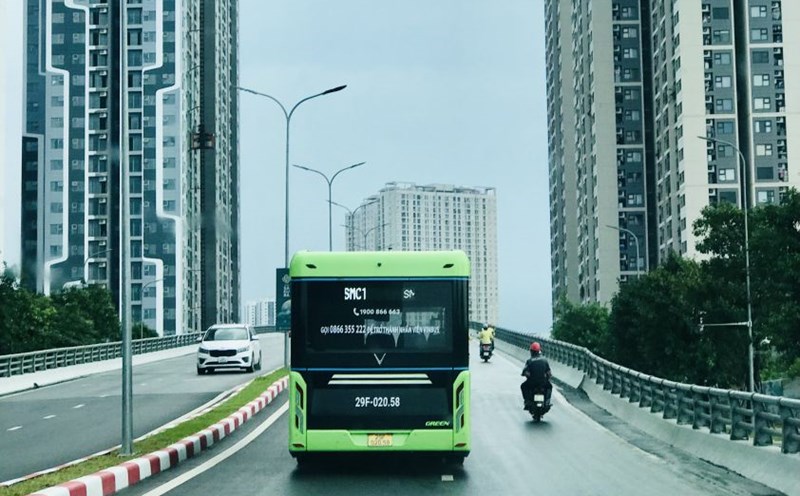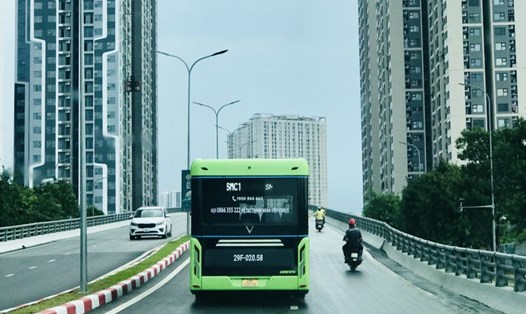Changes in community awareness

Dr. Luong Quang Huy - Head of the Department of Greenhouse Gas Emissions Reduction and Ozone Protection, Department of Climate Change (Ministry of Agriculture and Environment) said that in fact, the concept of "net zero emissions" may cause some misunderstandings that this is a state of no emissions. However, this is not entirely accurate. For a developing country like Vietnam, the need for greenhouse gas emissions still exists and is considered a legitimate right to serve the goal of socio-economic development.
Net emissions with "0" means that the emissions produced will be equivalent to the amount of greenhouse gases absorbed or offset. To achieve this state, the economy must go through a development stage, in which emissions still increase until the peak is reached. In other words, at that time, the emissions into the environment will reach the highest level before entering the decreasing phase.
Vietnam is expected to reach its peak emissions around 2035 - 2040. After this time, emission reduction measures will be implemented quickly and sustainably, aiming for the goal of 2050, when greenhouse gas emissions and absorption reach a balanced level. This is also the general definition of "net zero emissions".
According to Mr. Huy, people's awareness and the community about this goal is gradually being raised. The community is increasingly focusing on direct and indirect activities to reduce greenhouse gas emissions. In daily life as well as in business, service and commercial activities... The application of energy and fuel saving measures, especially in the transportation sector, has contributed significantly to reducing emissions.
"People not only participate in production and business activities at different enterprises and organizations. Notably, businesses' awareness of sustainable development has changed positively. They not only aim for net zero emissions but also actively implement circular economic strategies and environmental protection" - Dr. Luong Quang Huy analyzed.
Compulsory requirements of Vietnamese enterprises
Green transformation is no longer an option, but a mandatory requirement. Any business that does not comply with green conversion requirements in the coming time will be at risk of being eliminated from the market.

According to Associate Professor, Dr. Nguyen Dinh Tho - Deputy Director of the Institute of Strategy and Policy on Agriculture and Environment (Ministry of Agriculture and Environment), the green transformation process cannot be implemented intermittently or too intensively. Instead, there needs to be preparation to implement green transformation in the best way.
One of the important advice for businesses is: Green transformation is an irreversible trend and must be implemented, so each business needs to proactively develop a suitable action plan. If the transformation is too fast, high investment costs will make businesses uncompetitive. On the contrary, if the conversion is too slow, businesses will face the risk of being eliminated from the market.
Therefore, the planning and implementation process needs to be in sync with the requirements of non-tax barriers in the world, technical barriers also need to be grasped through associations related to the commodity industry such as aviation, maritime, textiles, steel, cement, chemicals - to promptly adjust production and business strategies to suit new requirements.
Along with digital transformation
At the launching ceremony of "Green Transformation - Joining hands for a sustainable Vietnam" organized by Lao Dong newspaper recently, Deputy Minister of Agriculture and Environment Le Cong Thanh quoted the view at the 13th National Party Congress, saying that green transformation along with digital transformation are identified as two fundamental factors for Vietnam to become a developed, powerful and prosperous country by 2045.
According to Dr. Luong Quang Huy, the green transformation process is always associated with digital transformation. These are two global trends that cannot be reversed. Vietnam is one of the first countries in the world to implement these two processes in parallel. This is a great advantage, because digital transformation will strongly support the development of science and technology, ensuring information and data sources, as well as applying data information technology to the green transformation process.
The application of digital technology not only supports the policy issuance process but also helps implement energy-saving measures, reduce greenhouse gas emissions nationwide and in all fields.
Digital transformation supports the green transformation process in terms of input, and vice versa, how effectively the green transformation process is implemented, digital transformation will support the assessment and better improve the green transformation process in the most optimal way and in the shortest time Mr. Huy analyzed.
According to Dr. Luong Quang Huy, there are currently many proposed solutions to promote the green transformation process. In particular, science and technology play an important role in reducing emissions. The transition from high-emission technology to low-emission technology, even zero-emission, is one of the key solutions to achieve sustainable development goals in industries, trade and services.
In addition, it is necessary to promote programs to support technology development by improving the quality of technical human resources, promoting international cooperation and taking advantage of experience from countries ahead.
For the goal of net zero emissions in particular and the green transformation and digital transformation across the country in general, when we do it fully and effectively, all people will benefit, while actively contributing to the socio-economic development of the country.
A challenge is the digital transformation process, with the increasing use of technology and electronic devices, which can also lead to increased greenhouse gas emissions. Some international studies have shown that if not properly controlled, digital transformation can contribute to environmental pollution.
Therefore, to truly become a driving force for green transformation, we need to promote access to advanced, environmentally friendly digital technologies, while ensuring the synchronization between technology tools. Only when these two processes are harmoniously and effectively integrated can we aim for sustainable development and build a clean, green society.
Associate Professor, Dr. HOANG ANH Le - Head of the Department of Environmental Management, University of Natural Sciences, Vietnam National University, Hanoi.











